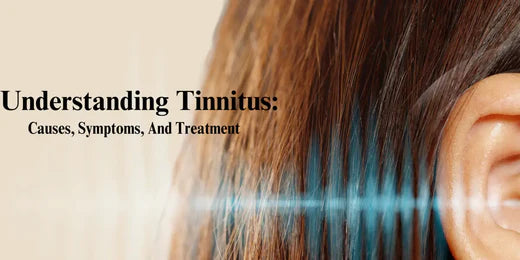
Understanding Tinnitus: Causes, Symptoms, And Treatment
Share
Tinnitus Meaning
Tinnitus is a pretty common and often annoying condition where you hear sounds like ringing, hissing, or buzzing, even though there’s no outside noise. It can lead to issues like hearing loss, certain medications, head injuries, and mental health issues like anxiety and depression. While no effective drug treatments exist, research is ongoing, and some surgical interventions may help with underlying otological conditions, though they may persist.
Table of Contents
Tinnitus Symptoms:

Tinnitus is when you hear weird sounds in your ears or head, even though there’s nothing making those noises outside. It can be different for everyone, but here are some common symptoms people experience:
- You might hear ringing, buzzing, roaring, hissing, humming, whistling, clicking, or squealing. The volume and pitch can change too—sometimes it’s soft, sometimes it’s loud, and it can be low or high. The sounds might be constant, come and go, or pulse.
- You could hear these sounds in one ear, both ears, or just in your head.
- Some patients say it sounds like air leaking, water running, the inside of a seashell, or even musical notes.
Tinnitus Causes
It is often linked to high-frequency hearing loss, but it’s more about how our brains adapt to not getting enough sound rather than just damage to the ear. While cochlear abnormalities may initiate tinnitus, it’s really the changes in the brain’s auditory system that keep it going. Its sensations often arise immediately after being exposed to loud noise, which makes it tricky to figure out these brain changes since they usually take a while to develop, typically over hours or days. Additionally, the pitch of the tinnitus often doesn’t align with the edge of hearing loss, indicating that brain activity might play a more significant role than we thought. There are some common causes listed below:
- Noise Trauma
- Earewax Buildup
- Medication
- Ear disease
- Metabolic disease
- Stress and anxiety
- Smoking
Tinnitus Types
There are various health issues—like otological (ear), neurological (brain), and psychological (mental) health problems—that can be linked to tinnitus, showing just how complicated it is. A better classification system based on underlying mechanisms could lead to more personalised treatment. approaches, emphasising the need for further research in both animal models and human subjects. Broadly speaking, there are two types of tinnitus: subjective and objective.
- Subjective Tinnitus is the most prevalent type in which people experience sounds that are inaudible to others, such as buzzing, hissing, or ringing. This form can vary in intensity and may be constant or intermittent, significantly impacting quality of life by causing stress, anxiety, and sleep disturbances. Common causes include exposure to loud noises, age-related hearing loss, earwax buildup, infections, medication side effects, and various medical conditions.
- Objective Tinnitus, a rarer form, involves sounds that can also be heard by others, typically detected by a healthcare professional using a stethoscope. Its causes may include abnormal blood vessel development, muscle spasms, or eustachian tube dysfunction.
Rhythmical or Pulsatile Tinnitus
Based on the sound produced, it could be rhythmical or pulsatile . Pulsatile tinnitus occurs in two different forms.
- Synchronous (it is likely a result of vascular origin)
- Asynchronous (it is likely the result of middle ear or palatal muscle myoclonus).
Tinnitus Treatment
- Subjective Tinnitus treatment focusses on symptom management and addressing underlying causes through therapies like tinnitus retraining therapy, cognitive behavioural therapy, sound masking, and medications.
- Objective Tinnitus Treatment, on the other hand, is more focused and frequently addresses the particular, identifiable cause. This may entail taking medication, altering one's lifestyle, or having surgery.
Is Tinnitus Curable?
People manage it in different ways, like using hearing aids, sound therapy, or talking to someone about it. Cognitive behavioural therapy (CBT) can be beneficial for some, but it’s not easy to find everywhere. As people age, it tends to become more prevalent. It can be difficult to determine the most effective treatments because its symptoms vary greatly amongst people. Numerous elements, such as loud noises, being overweight, and certain medications, can play a role in developing it, and it often goes hand-in-hand with anxiety and depression. Overall, it is a complicated issue, and how people experience it and respond to treatment can vary a lot.
Is Tinnitus Dangerous?

Tinnitus is usually not harmful. But occasionally, it might indicate a serious underlying illness that needs to be treated. It can sometimes be a symptom of serious conditions that require treatment. Potential causes include head or neck trauma, which can damage nerves or brain areas related to sound processing; tumours, such as acoustic neuromas; blood vessel issues like high blood pressure or arterial hardening; and chronic health conditions, including diabetes, anaemia, thyroid disorders, migraines, and autoimmune disorders. If it occurs in one ear along with neurological symptoms like hearing loss or vertigo, it may indicate more serious issues such as multiple sclerosis, tumours, or brainstem infarctions.
Frequently Asked Questions
1. What is tinnitus?
Even in the absence of any outside source, when you hear a sound in your head or ears, it is known as tinnitus.
2. How to cure tinnitus?
Treatment depends on whether there is an underlying cause or not. In the case of the former, the doctor will recommend appropriate treatment accordingly.
3. What causes tinnitus?
They can strike suddenly, progress gradually, or occasionally occur during a person's lifetime. There are a number of potential causes, including vascular disorders, anaemia, loud noises, ear issues, and medications.
4. Can tinnitus be cured?
Although it cannot be cured, there are methods to lessen symptoms by determining the underlying cause of the condition.
